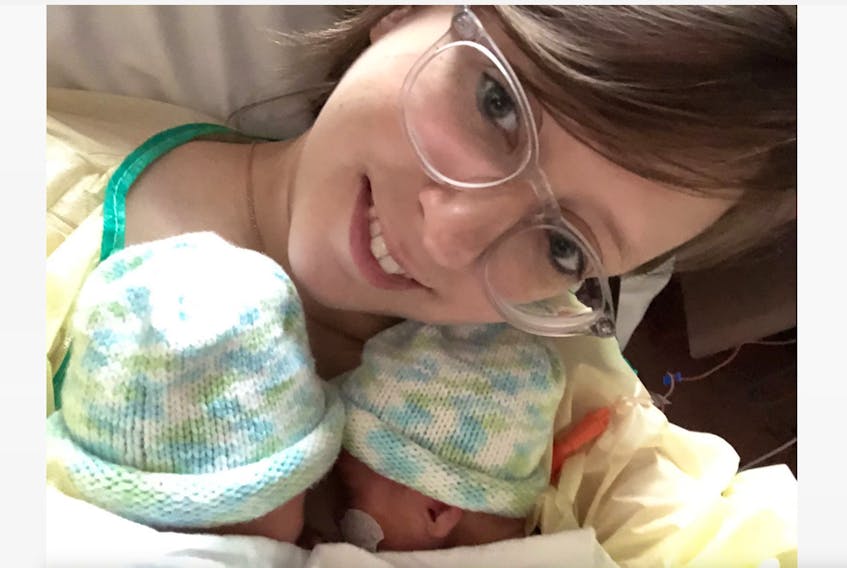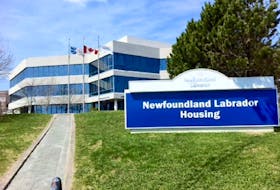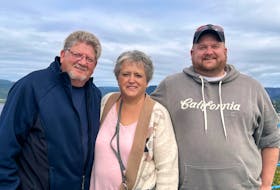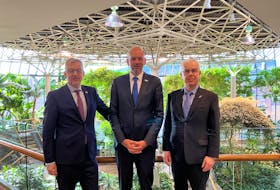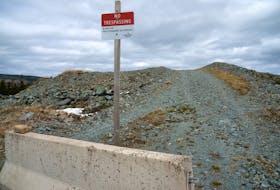ST. JOHN'S, N.L. — Over 100 high-risk newborns hospitalized at the Janeway neonatal intensive care unit (NICU) are stronger today thanks to donations of human breast milk through a program initiated last year.
Among those are Leslie Hewlett’s five-week-old twin boys, Jude and Dorian Harding, who were born 10 weeks prematurely in October.
“I think most mothers just assume that they will be able to breastfeed right away, and I kind of assumed that as well,” said Hewlett, who is a resident of Gander, but was rushed to the hospital in Grand Falls-Windsor, then airlifted to the Janeway when the boys arrived early.
They were eight days old before they could be taken out of their incubators together.
“I couldn’t even really hold them. So, these signals that kind of tell your body, OK, it’s time to make milk, I didn’t get any of them. So, it took me weeks in order to be able to produce my own milk.”
“You kind of start to measure your self-worth by how much milk you can pump. … It was coming in, like, a little bit, and it was really hard because you’re just like, ‘I want to be good at this. I want to be a good mother, and I can’t even make food for you.'” — Leslie Hewlett
Hewlett said it was a very difficult time.
“You kind of start to measure your self-worth by how much milk you can pump. … It was coming in, like, a little bit, and it was really hard because you’re just like, ‘I want to be good at this. I want to be a good mother, and I can’t even make food for you.'”
She calls it “a real blessing” to have donor breast milk available, which fed her boys for a month.
Over three hundred litres of pasteurized human donor breast milk have been shipped to the Janeway since it began the program in March 2018 with the Rogers Hixon Ontario Human Milk Bank, one of four milk banks in Canada.
Established in 2013, the milk bank collects donated breast milk from volunteer lactating women, pasteurizes it and distributes it by prescription to medically fragile babies in NICUs. The mothers of these babies are often unable to provide a sufficient amount of milk due to medical and other reasons.
While a mother’s own milk is the best source of nutrition for premature infants, among the 70 per cent of mothers in NICUs who for many reasons don’t have a full volume of milk, the Canadian Paediatric Society recommends pasteurized human donor milk for their high-risk newborns.

Protective qualities
“Human milk is not just their nutrition, I think it’s also a medicine,” said Dr. Sharon Unger, a neonatologist and medical director of the Rogers Hixon Ontario Human Milk Bank.

“It really protects their health. In particular for the smallest babies, they’re at risk of this condition called necrotizing enterocolitis, which is really a severe inflammatory condition of the bowel that preterm babies are prone to which carries a very, very high morbidity and mortality," Unger said.
“And we know that bovine cow’s milk puts them at higher risk for it, and human milk protects them from it.”
She said without donor milk, the only option is to give a baby intravenous nutrition while waiting for the mother’s milk, and it can only be done for a few days before the baby needs milk.
Without donor milk, formula is used, which doesn’t have the same protective qualities for medically fragile babies.
“I remember before we had the milk bank … I would make my rounds in the intensive care unit, and you would see the mom there holding her preterm baby, and everybody looking at her and saying, ‘Do you have any milk yet?’ And it was so, so stressful for those moms with an entire medical team saying, ‘Is your milk coming in? Is your milk coming in?’”
Rogers Hixon Ontario Human Milk Bank screens volunteer mothers to the same level as blood donors, requiring blood work, an interview and consent from both the donor’s and baby’s doctors. If approved as volunteer donors, women ship their milk to the milk bank, where it is pasteurized to ensure there is no bacteria in it, and is tested for safety.
Dr. Julie Emberley, division chief at the Janeway NICU, said donor milk has made a positive effect on the health of premature babies.
“It’s made a big impact to our babies in the unit with the babies whose central lines (a catheter placed into a large vein) are removed faster, and babies are up to full feeds sooner. It’s really been tremendous.”

Local donation
Emberley said since the program began last year, and more people become aware of donor breast milk, there’s going to be more interest in donating in this province.
To do that, a process is underway to arrange local blood testing for the milk bank, she said.
“That’s the one piece of the puzzle that we don’t have quite worked out yet.”
Hewlett believes it would be wonderful for mothers in this province who have benefitted from the milk bank to be able to give back.
“There’s many mothers here (at the Janeway) that I’ve met that have really needed that milk, and there’s also so many mothers here that I’ve found once they have their milk established, they almost end up having extra, and it’s such a precious thing that you don’t want it to go to waste.”
Meanwhile, Hewlett hopes her babies won’t be at the Janeway much longer.
“They’re really healthy, they’ve gained a lot of weight, they’re pretty sturdy and they’re starting to breastfeed from me now, which is awesome.”
Twitter: @juanitamercer_
RELATED:

